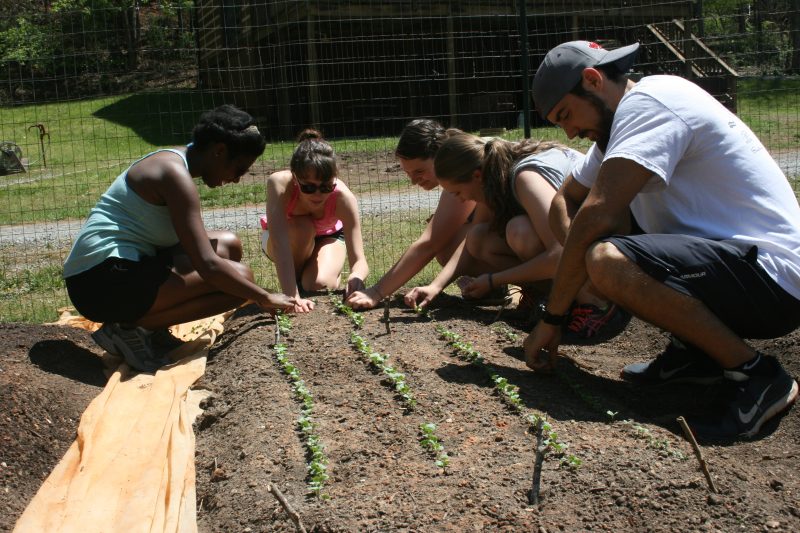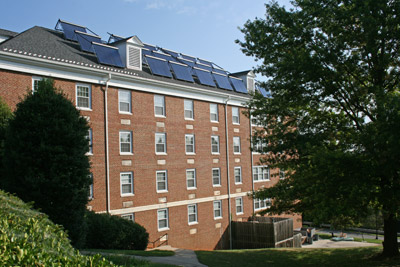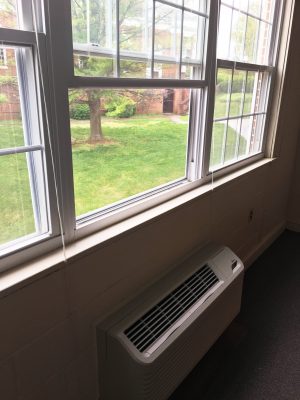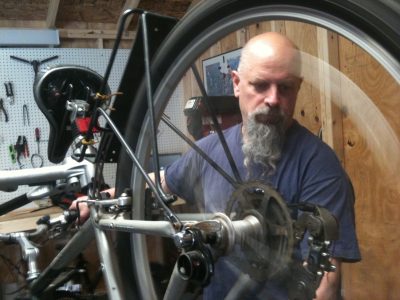Sustainability is a buzzword in many organizations, but it’s serious business at University of Lynchburg. In honor of Earth Day 2016, here are five ways LC and its people work to make the planet a bit better.
1. Community Garden

A former volleyball court at Beaver Point is growing into a community garden thanks to efforts led by Dr. Laura Henry-Stone, an environmental studies professor.
Dr. Henry-Stone thought the plot near College Lake was perfect: it receives abundant sunshine, it has a convenient water supply from a spigot by the Beaver Point clubhouse, and the sand would provide good drainage.
The College’s sustainability funding provided money for garden-blend soil, and compost from the campus fertilizes the plants. Dr. Henry-Stone’s Sustainable Living class adopted the garden as an experiential lab project this semester, and a recent graduate helped install a fence. Several students who will be on campus this summer have volunteered to help keep the garden going. Some friends of the environmental studies program have offered to provide chicken coops and chicks.
Although the garden won’t feed an army, it will teach students now and in the future about sustainable methods of raising food .
The students have planted peas, broccoli, potatoes, lettuce, kale, and other crops. Dr. Henry-Stone anticipates the first harvest by Commencement. “After that, the garden planting and harvesting will unfold organically,” she said, no pun intended.
2. Green Energy

When you turn on a light switch or charge your mobile phone at LC, you are taking advantage of clean, renewable energy.
LC buys electricity through Collegiate Clean Energy, a subsidiary of INGENCO, which produces power by burning methane emitted from landfills. This electrical generation method prevents the creation of CO2 and gets rid of methane. That’s like killing two greenhouse gasses (and no birds) with one stone.
The College also utilizes solar power, including a solar hot water system seen atop Montgomery Hall and a 5 kw photovoltaic panel on Schewel Hall. But we also are exploring possibilities for deploying solar on additional rooftops, parking lots, and other locations.
Our investment in clean energy has saved the College thousands of dollars and also reduced greenhouse emissions.
3. Energy-saving AC

Of course, using renewable power doesn’t make it wise to waste energy, so there are a multitude of energy conservation features around campus, such as energy-efficient lighting.
Heating and air conditioning comprise a major source of energy usage for any organization, and LC is mindful of ways to save energy in this area. Several buildings are outfitted with upgrades that use less power while keeping occupants comfortable.
These upgrades include new Energy Star-rated windows in Tate Hall, efficient HVAC at the library, and Montgomery Hall air conditioning units that shut off when a room is open, keeping temperature-controlled air from being wasted.
Because running your air conditioner and blowing the air out the window is not going to cool the climate.
4. The Bike Shack

Biking provides a way to improve fitness while also enjoying a pollution-free commute. Faculty members started The Bike Shack to encourage more people to pedal rather than drive.
Every semester, the shack opens for a couple of afternoons each week so community members can get help repairing bicycles. The Shack also repairs donated bikes and finds homes for them.
The Bike Shack recently hosted a group of Lynchburg youth who wanted to learn about bicycle maintenance and repair. Volunteers also fixed up bikes to donate to children at Miriam’s House and the Jubilee Family Development Center in Lynchburg.
5. Saving water
In 2010, the City of Lynchburg actually thought LC’s water meter may have been broken. After all, the amount of water being used had taken a precipitous dive.
But in fact, we had just completed a campus-wide retrofit with low-flow showerheads, faucets, and toilets, as well as a “smart” irrigation system that doesn’t water fields when rain has taken care of the job. In the fall semester of 2010, LC saved 4.5 million gallons of water, and the savings continue today. This means less water has to be used and less water has to be treated. Another win-win scenario.
LC also practices conservation with a Rain Garden below the Drysdale Student Center and underground stormwater tanks that help manage runoff. These campus features help reduce the erosion that would otherwise result from water running off of building and parking lots.
These are only five aspects of sustainability on the University of Lynchburg campus. We could go on for a while. We also continue looking for more ways to save natural resources and operate more efficiently. For LC, sustainability is not a passing fad, a gimmick, or a checklist. It’s a way of life.

